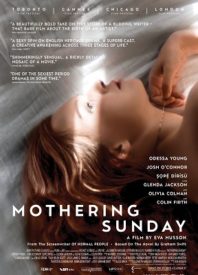
Jane Fairchild (Odessa Young) is an English writer and orphan working as a country house maid during the 1920s. During one of the days when she’s at work, she answers the phone. She tells the person on the other end that they dialed the wrong number. Anyone with basic understanding of filmic language would understand that the person on the other line actually means to talk to Jane. That person is Paul (Josh O’Connor). Paul can only be her lover and nothing more because he is a resident of a manor house. This is not the kind of love that lasts but is one that Jane would think about as an older, successful writer (Glenda Jackson).
Other critics describe Eva Husson’s Mothering Sunday as a meditation of love. That’s probably what it was when Alice Birch adapted Graham Swift’s novel. But at it’s best, it’s a meditation of the two characters experiencing that love. Specifically, it’s a meditation on Josh O’Connor. Imagine Paul as someone like Prince Charles except that he is nicer and was alive two generations back. There’s something inherently interesting about the canvas that is O’Connor’s face. His smile, his ability to dig lines all over his face to reveal or hint at a trauma. His face is doing that explanation to viewers. It’s not like the sound quality helps with any comprehension viewers can get out of his monologues. Young is also a discovery, a silver lining as she plays Jane in two of the three timelines that this movie shows.
By the way, one third of the movie takes place in one day, specifically, Mother’s Day in 1924, where the characters have conversations about things that happened a decade before. I spent too much time looking up recent movies depicting the same era, but those movies declare themselves into existence. This one, however, treats its shocking subjects like shrinking violets. In other words, it talks around its subjects instead of talking about them. It also shows the occasional sex scene. Surprisingly, these scenes seem boring in comparison to a few other recent films with sex or nude scenes. This also wouldn’t be a period piece if it didn’t have a woman having a valid emotional outburst. Playing that character is Olivia Colman which, how dare this movie put Olivia Colman in a corner. The score also doesn’t fit with the movie and definitely not in a good way.
The movie focuses on the memory of that fateful day in 1924. In one of those memories, Colman’s character delivers another monologue about guilt. Thankfully, the production gave her a better boom mic. But anytime I hear a monologue about guilt or love or pain makes me feel like it treats its words like they don’t matter. Or when it does, it makes those words more insulting than their intention. There are moments of clarity though. The aristocratic characters (Colin Firth playing one of them) treat Jane like she’s a person. But it would be more compelling to have seen those class dynamics play out in the later years of Jane’s later life. Specifically, Jane’s ‘middle years’ has her living with a Black man (Sope Dirisu) – why is the movie not about that instead?
- Release Date: 4/8/2022

